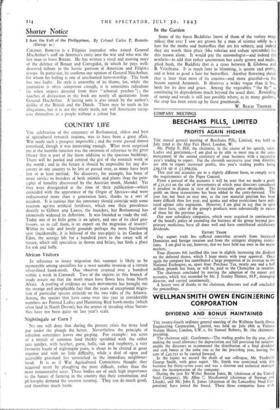COUNTRY LIFE
THE celebration of the centenary of Rothamsted, oldest and best of agricultural research stations, was to have been a great affair. War made such a prospect impossible ; and the event passed almost unnoticed, though it was interesting enough. What most surprised me at the humble function was the omission of reference to the great library that is part of the latest addition to the spacious buildings. There will be pooled and centred the gist of the research work of the world ; and in the future it should be impossible for any dis- covery in any country to be lost or passed over, as many have been lost or at least mislaid. No discovery, for example, has been of more servicz to breeders of both animals and plants than the prin- ciples of heredity discovered by the Austrian monk, Mendel. Yet - they were disregarded at the time of their publication—which coincided with the appearance of the Origin of Species—and were rediscovered more than a generation later, thanks to a sort of accident. It is curious that the centenary should coincide' with some reaction aga:nst artificial fertilisers, which owe their prevalence directly to Gilbert and Lawes, the founders, but Rothamsted has immensely widened its definition. It was founded to study the soil. Today one of its little gems is an apiary, and one of its chief pro- fessors, so to call them, is an expert on the migration of insects! Within its wide and lovely grounds perhaps the most fascinating spot (incidentally, it is beloved of the tree-pipit) is its Garden of Eden, the acreage left for a hundred years to the sweet will of nature, which still specialises in thorns and briars, but finds a place for oak and holly.
African Visitors
In reference to insect migration this summer is likely to be memorable among specialists for a most notable invasion of a certain silver-lined hawk-moth. One observer counted over a hundred within a week in Cornwall. Two of the experts in this branch of study assure me that the moth must have flown here from North Africa. A pooling of evidence on such movements has brought out the strange and inexplicable fact that the years of exceptional migra- tion of particular species coincide on the two sides of the Atlantic. Among the species that have come over this year in considerable numbers are Painted Ladies and Humming Bird hawk-moths (which often land in North Devon); but the armies of invading white butter- flies have not been quite on last year's scale.
Nightingale or Corn ?
No one will deny that during the present crisis the more land put under the plough the better. Nevertheless the principle of selection sometimes leaves one gasping. For example: ten acres of a stretch of common land thickly sprinkled with the rather rare juniper, with heather, gorse, holly, oak and raspberry, a very favourite haunt of nightingale pairs, is about to be cleared at great expense and with no little difficulty, while a deal of open and accessible grassland lies untouched in the immediate neighbour- hood. It is as if War Agricultural Committees thought they acquired merit by ploughing the most difficult, rather than the most remunerative acres. These bodies are of such high importance to the future of farming in the country that their constitution and phrlosophy demand the severest scrutiny. They cart do much good; and therefore much harm. Some of the finest Buddleias (most of them of the variety mag- nifica) that ever I saw are grown by a man of science solely ap a lure for the moths and butterflies that are his subject; and indeed they are worth their place (like valerian and sedum spectabile) for this reason alone. It would pay the entomologist—and indeed the aesthete—to add that rather uncommon but easily grown and multi- plied bush, the Buddleia that is a cross between B. Globosa and B. Veitchiana. It is much later in blooming, is quaint and pretty, and at least as good a lure for butterflies. Another flowering shrub that is later than most of its cousins—and more graceful—is the broom named Aetnensis. It deserves a wider vogue than it has, both for its date and grace. Among the vegetables "the fly" is continuing its depredations much beyond the usual date. Reseeding of turnip and swede is still just possible where, as in many gardens, the crop has been eaten up by these gourmands.
W. BEACH THOMAS.






















 Previous page
Previous page